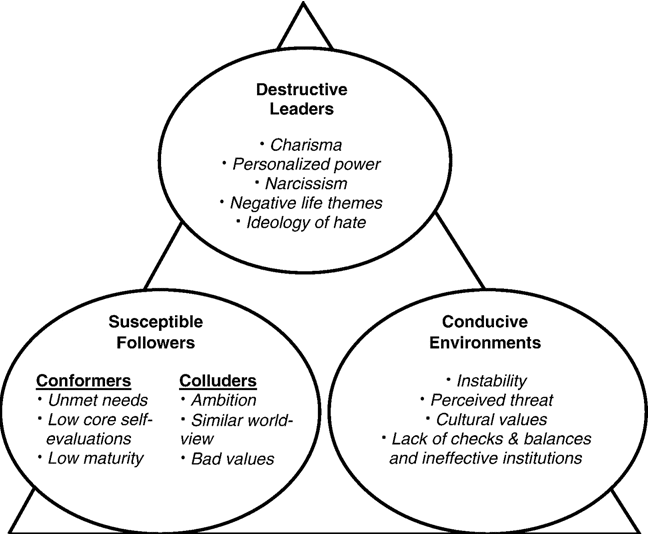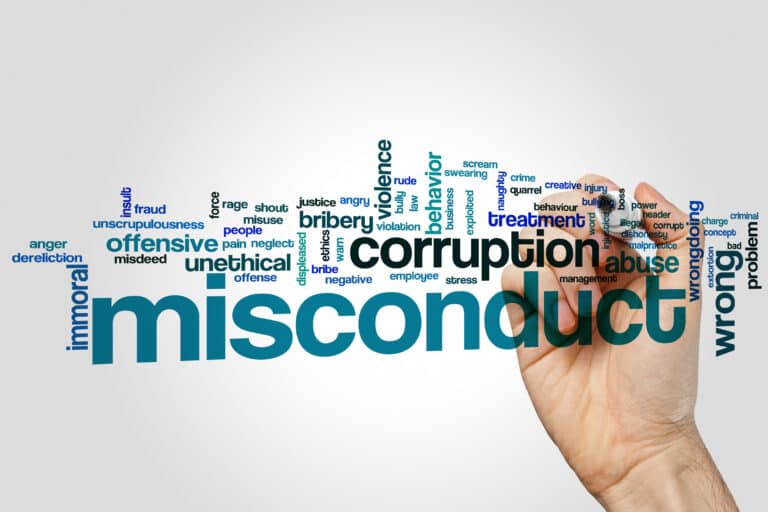Article Summary:
Some organizations are unethical. Here we outline how you can determine if your organization is unethical. Our next article will outline what you can do about it.
+++
How can you determine if you work for an unethical organization?
No organization is perfect. All leaders are fallible. But some organizations are downright unethical, exhibiting a pattern of dishonest or corrupt behavior over time. These organizations repeatedly mistreat their stakeholders. If the organization knowingly harms people, animals, or the environment, it’s unethical. In an unethical organization, there are invariably multiple leaders crossing the line.
Unfortunately, many organizations struggle with ethics, and fraud and corruption are big problems around the world. According to the Financial Cost of Fraud Report in 2019, fraud costs businesses and individuals across the world about $5.127 trillion each year. The 2022 Global Business Ethics Survey notes that 34% of U.S. workers observed misconduct in the workplace in the past year.
Most organizations are mixed, with mostly ethical behavior and occasional lapses. Some organizations operate in industries where corruption is widespread. Others are run by unethical or even toxic leaders with a skewed perspective on how organizations should function.
Toxic Leaders and Workplaces
Claremont Professor Jean Lipman-Blumen defines toxic leaders as “individuals who, by virtue of their destructive behaviors and their dysfunctional personal qualities or characteristics, inflict serious and enduring harm on the individuals, groups, organizations, communities, and even the nations that they lead.”
Such leaders can create a toxic workplace, which Wharton Professor Nancy Rothbard defines as one “in which employees feel personally threatened in one way or another.”
Researchers have identified what they call a “toxic triangle” in some organizations, with destructive leaders, susceptible followers, and conducive environments:


Leadership Derailers Assessment
Take this assessment to identify what’s inhibiting your leadership effectiveness. It will help you develop self-awareness and identify ways to improve your leadership.
Rationalizations for Unethical Behavior
Unethical leaders rationalize their problematic behavior with justifications like:
- “Business is business.”
- “You don’t understand the pressure we’re under.”
- “Everybody else is doing it.”
- “It’s just this one time.”
- “No one will find out.”
- “It’s not lying. It’s just not telling the truth.”
- “We need to do this to stay in business.”
- “We must maximize shareholder value.”
“I… rationalized that what I was doing was OK, that it wasn’t going to hurt anybody.”
-Bernie Madoff, mastermind of the largest Ponzi scheme in history
Their followers may justify their compliance with excuses like:
- “My boss told me to do it.”
- “I didn’t do anything. I just looked the other way.”
- “It’s not my responsibility, so I’m not getting involved.”
(See our articles, “Rationalizations that Derail Leadership” and “The Problem of Bad Leaders–And Why People Keep Following Them.”)
Other signs of unethical behavior include managers asking you to “just keep this between us,” refusing to put things in writing, and refusing to answer questions about things that concern you.

Personal Values Exercise
Complete this exercise to identify your personal values. It will help you develop self-awareness, including clarity about what’s most important to you in life and work, and serve as a safe harbor for you to return to when things are tough.
How to Determine If Your Organization Is Unethical
Unethical leaders often go to great lengths to disguise their actions. It’s not easy to discover what’s really going on, but there are telltale signs. Here’s our checklist to help you determine if you work in an unethical organization:
- Are financial reports falsified? (Are orders shipped to customers with secret side letters stating the items can be returned after the end of the quarter? Are shipments post-dated to manipulate quarterly results, or are kickbacks secretly paid to major customers?)
- Does the organization overcharge unsuspecting customers?
- Are products substandard in quality, dangerous to use, or sold with false claims?
- Does the organization operate with conflicts of interest?
- Do officers lie, deceive or mislead people, or withhold information?
- Are safety violations rampant and/or unaddressed?
- Do officers falsify tax returns to reduce taxable income?
- Does the organization emit dangerous chemicals or pollutants to avoid the costs of proper disposal?
- Do leaders break contracts when they’re unprofitable or inconvenient?
- Does the organization employ dirty business practices (e.g., defaming competitors via fake social media accounts or changing the shelf placement of competitive products)?
- Do leaders accept high worker turnover without meaningful efforts to understand and address it?
- Are layoffs the norm at the first sign of a slowdown?
- Is the work environment filled with excessive stress and pressure, impairing workers’ physical and mental health?
- Does the organization exploit workers with below-market wages or wages insufficient for a decent living in their area?
- Are workers, vendors, or customers discriminated against due to gender, race, age, political views, or other factors?
- Is sexual harassment prevalent and continuing?
- Is nepotism present?
- Are certain workers or vendors improperly favored?
- Are bullying managers tolerated?
- Is confidential information improperly disclosed?
- Do managers retaliate against people who speak up or ask questions?
- Do leaders take credit for the ideas or work of others?
- Are mistakes, deficiencies, or violations covered up?
- Are there incidents of sabotage against or theft of organizational assets?
- Is there theft of the intellectual property of competitors?
- Are there indications of bribery?
- Does insider trading occur?
- Does money laundering occur?
- Are there indications of procurement fraud?
- Are there other signs of unethical behavior?
According to the 2022 Global Business Ethics Survey, “In the U.S. and globally, the most common types of observed misconduct included favoritism, management lying to employees, and conflicts of interest.”
Reflection Questions
- Are you working for an unethical organization—or working for an unethical manager?
- If so, what will you do about it? (See also our article on what to do about it.)
Tools for You
- Leadership Derailers Assessment to help you identify what’s inhibiting your leadership effectiveness
- Personal Values Exercise to help you determine and clarify what’s most important to you
- Alignment Scorecard to help you assess your organization’s level of alignment

Alignment Scorecard
When organizations aren’t aligned, it can reduce performance dramatically and cause frustration and dysfunction. With this Alignment Scorecard, you can assess your organization’s level of alignment and make plans for improving it.
Related Articles
- “What to Do If You Work for an Unethical Organization”
- “Toxic Leaders, Susceptible Followers”
- “What to Do If You Work for a Toxic Boss”
- “BAD Leadership: 7 Types”
- “Why People Fall for Toxic Leaders”
- “The Problem of Bad Leaders—And Why People Keep Following Them”
- “The Best and Worst Bosses: Implications for Leaders”
- “Ethical Challenges Across Industries—Implications for You”
- “Why Are We Talking About Ethics?”
- “The Dangers of Toxic Micro-Cultures”
- “The Ethical Challenges Faced by Leaders”
- “Ethical Decision-Making: Simple Tests”
- “Leadership and the Ethics Imperative”
- “What’s Your Leadership Quest?”
- “The Importance of Integrity in Leadership”
- “The Root Cause of Ethical Failings”
- “Rationalizations that Derail Leadership”
- “Are You Strong Enough to Be a Voice of One?”
- Bronwyn Fryer, “When Good People Work for Bad Companies,” Harvard Business Review, October 2012
- Nancy Rothbard, “Is Your Workplace Tough—Or Is It Toxic?” Knowledge at Wharton, August 2015
Resources for You
- National Whistleblowers Center (run by private attorneys, also with an attorney referral service)
- U.S. Department of Labor Page on Whistleblower Protections
Postscript: Quotations on Ethical Leadership
- “Unethical behavior significantly increases the cost of doing business.” -Frank Sonnenberg
- “When trust is low, in a company or in a relationship, it places a hidden ‘tax’ on every transaction: every communication, every interaction, every strategy, every decision is taxed, bringing speed down and sending costs up. My experience is that significant distrust doubles the cost of doing business and triples the time it takes to get things done.” -Stephen M.R. Covey
- “People may be very talented but, if they are unethical, they will lose everything in the end.” -Paulo Coelho
- “Success without honor is worse than fraud.” -author unknown

Triple Crown Leadership Newsletter
Join our community. Sign up now and get our monthly inspirations (new articles, announcements, opportunities, resources, and more). Welcome!
+++++++++++++++++++++++
Gregg Vanourek and Bob Vanourek are leadership practitioners, teachers, and award-winning authors (and son and father). They are co-authors of Triple Crown Leadership: Building Excellent, Ethical, and Enduring Organizations, a winner of the International Book Awards. Check out their Leadership Derailers Assessment or get their monthly newsletter. If you found value in this, please forward it to a friend. Every little bit helps!

